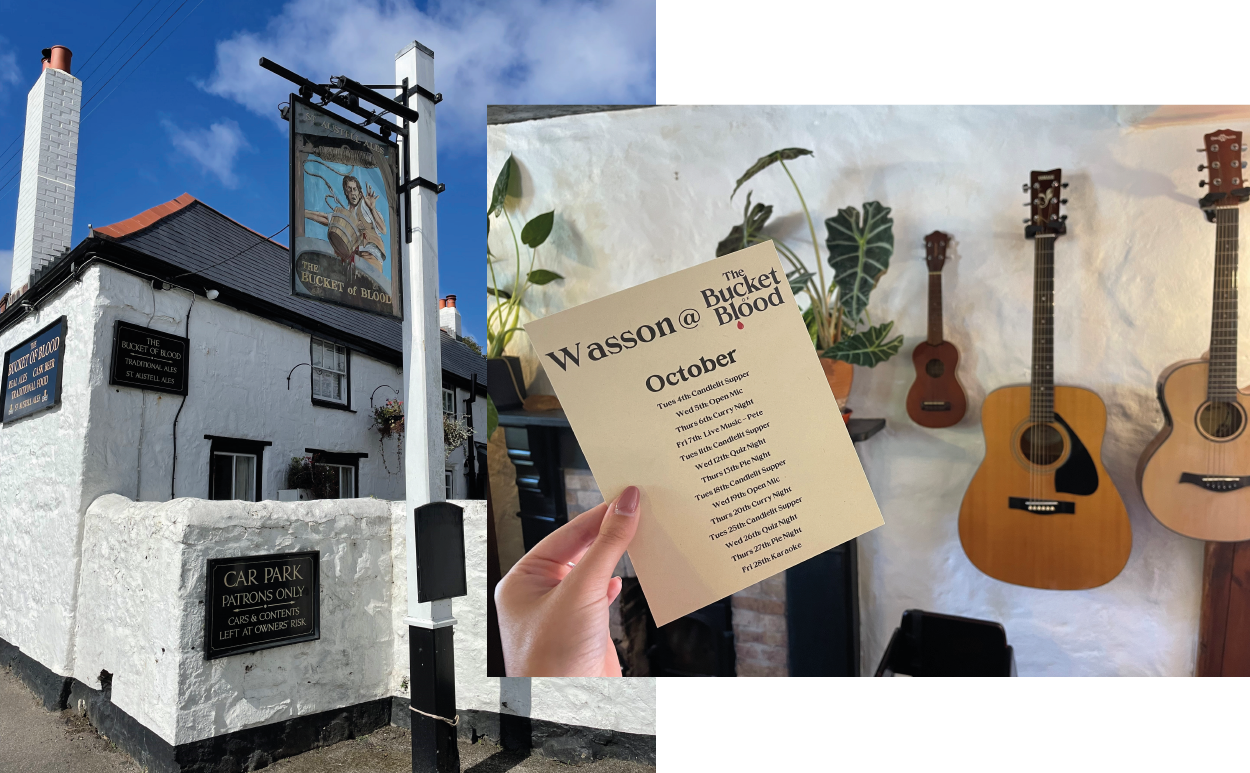Step into our history: Bucket of Blood, Phillack
T his October, we’re featuring the Bucket of Blood as our pub for History of the Month – just in time for Halloween.

With a name unlike any other, the Bucket of Blood spikes your interest immediately, before even walking through the door! Macabre tales have led to the inn gaining a reputation for paranormal activity, making it the natural choice ahead of spooky season.
Draw up a chair and join us for a paranormal pint as we dive into the history of the Bucket of Blood, located in Phillack – a must visit for any ghostbuster.
What’s in a name?
There are several stories surrounding the origin of the inn’s unusual name. The first relates to a former landlord who pulled the bucket from his well expecting water but instead found it full of blood. On investigation, it was said that the well contained the mutilated corpse of a local smuggler – it’s a no wonder the inn had gained such a reputation for paranormal activity!
It is more likely, however, that the well contained red water due to run-off from the local tin mining but the inn has retained the grisly name ever since. Fancy seeing the origins of this story for yourself? You’ll still find the well just a stone’s throw from the Bucket of Blood.
Until 1980, the premises was known as the New Inn, a name that first appears during the late 18th century when Robert Winn was the tenant. It’s thought the pub was purposely built as an inn to serve the local mining community by one of the mining companies operating in the area.
Landlords through the year
By 1830, John Floyd was the tenant. Like many innkeepers, he had other business interests, and in this case, he was the principal shareholder in the schooners ‘Maria’ and ‘Betsey’ which traded out of Hayle. His son Richard took over the premises upon his death, managing the nearby Royal Standard Inn alongside it.
In 1850, the tenancy was passed to Edward Hawke, who was prosecuted in 1859 and fined one shilling with costs for keeping late hours. Likewise, William Williams, tenant in 1881, lost his license for permitting drinking after hours. The business went through a turbulent period, having a high turnover of landlords during the late 19th century – Alfred Serpell, Thomas R Champion, Finnemore Dunstan, John Hammond, and Ernest Kennard all ran the business before the outbreak of the First World War.

Into the 20th century
The premises was sold by Sampson Waters to the Reverend Fredrick Hocklin in 1886. Sampson was born in nearby Scorrier in 1805 and found employment in the late 1820s at the Minas Gerais of Gongo Soco as a subordinate agent with the Imperial Brazilian Mining Company. He returned to Cornwall in 1831 and managed mines near Hayle until 1839, when he travelled to Chile as a mine agent. He later became the Principal Agents and Managing Director and in consequence, became a very wealthy man. Hocklin was the third generation to hold Rectorship of Phillack, he was a significant and aspiring landowner in the area having purchased the land of the former Riviere Estate from the Cornish Copper Company in 1868.
In 1899, the New inn was sold by Hockin’s son, Thomas Edmund, for £200 to Christopher Ellis & Son Ltd, brewers of Hayle.
The Ellis family had been brewing in Helston since at least 1804, when records show John Ellis as the subject of an excise investigation. Establishing premises in Hayle and Helston, the brewery passed through several generations of the Ellis family, the business ebbing and flowing alongside the fortunes of the Cornish mining and agricultural industries.
The Hayle Brewery premises were constructed between 1842 and 1877 – in 1888, it was restyled as a ‘steam brewery’ but, despite initial success, the business soon floundered as a consequence of the economic depression and a decline in Cornish mining. It became a limited company in 1897 and survived until 1934 when it went into voluntary liquidation.
Building up a portfolio
Consistent with the ambition of the company, in 1934, Walter Hicks & Co purchased the Christopher Ellis and Sons Steam Brewery in Hayle along with 30 licensed premises for £50,000. Included in this transaction was the New Inn, which in itself cost the brewery £1,200.
After the purchase, Taylor and Chandler operated the business between 1937 and 1963, then passing to three generations of the Shackleton family, tenants of the inn until 1975.
The here and now
Today, you’ll find Peter and Nicola at the helm, having taken over earlier this year. Restoring the pub to its former glory, it’s a popular haunt for both locals and visitors alike, with live music weekly, perfectly poured pints, and twists on traditional dishes.